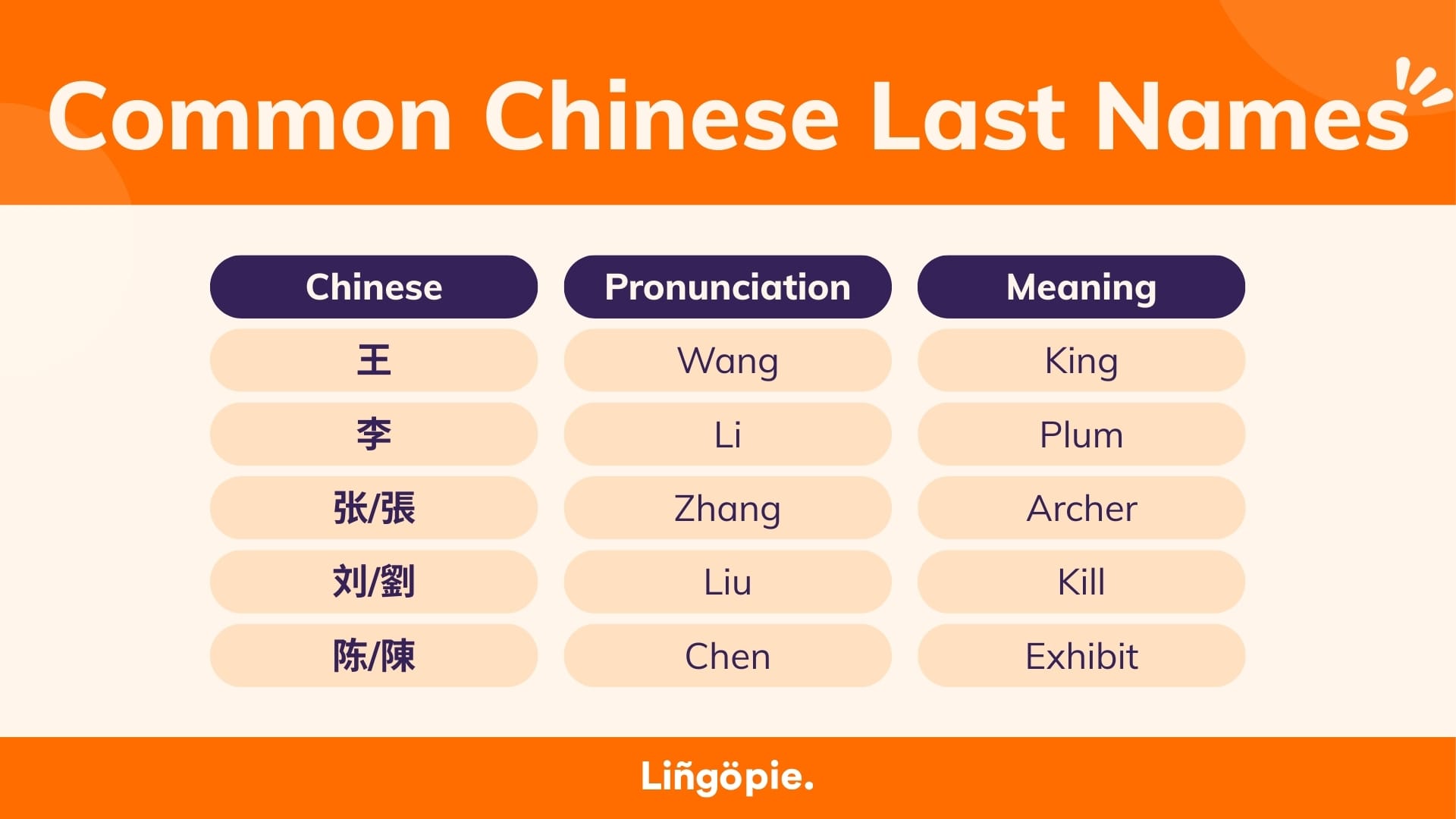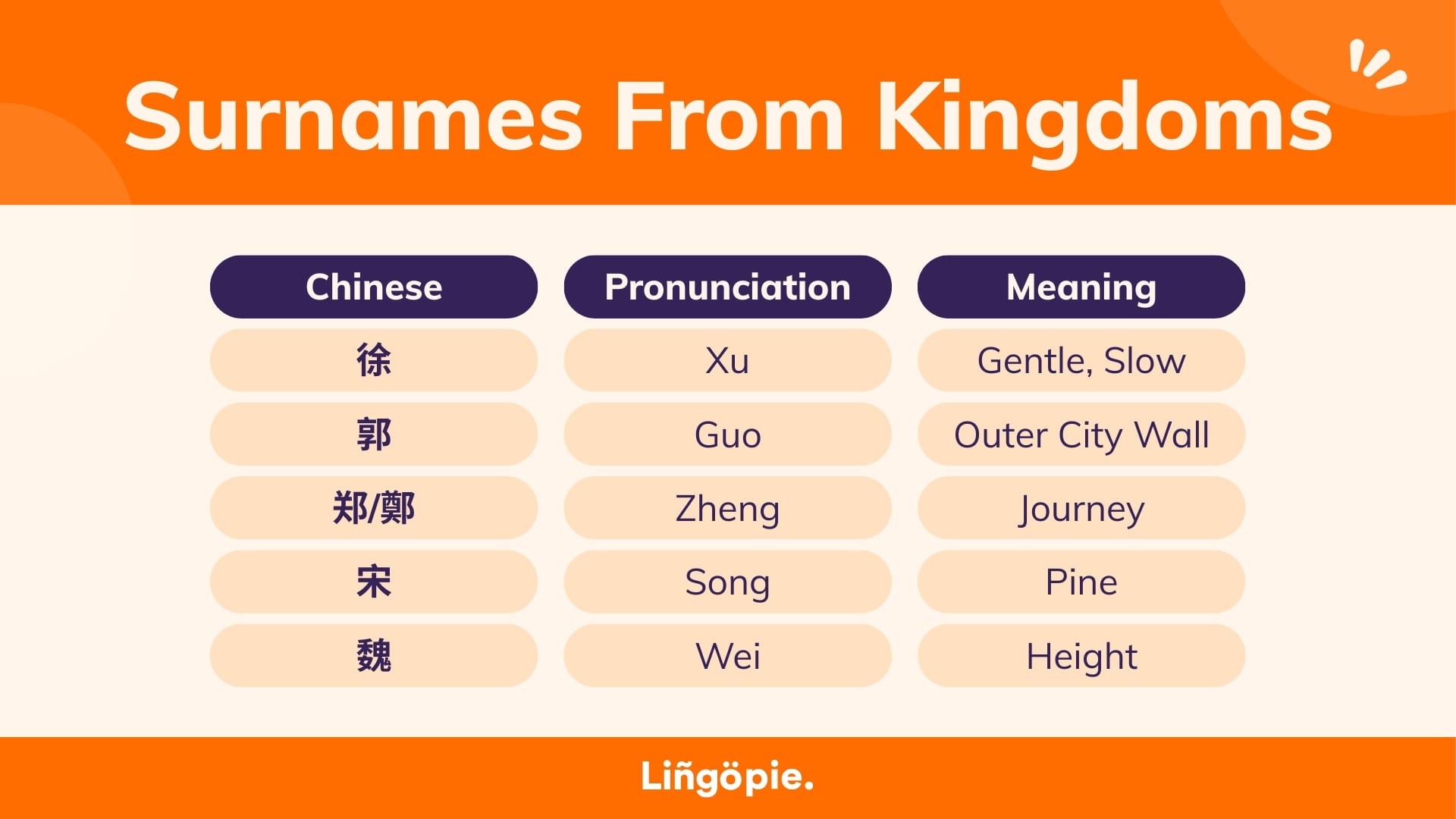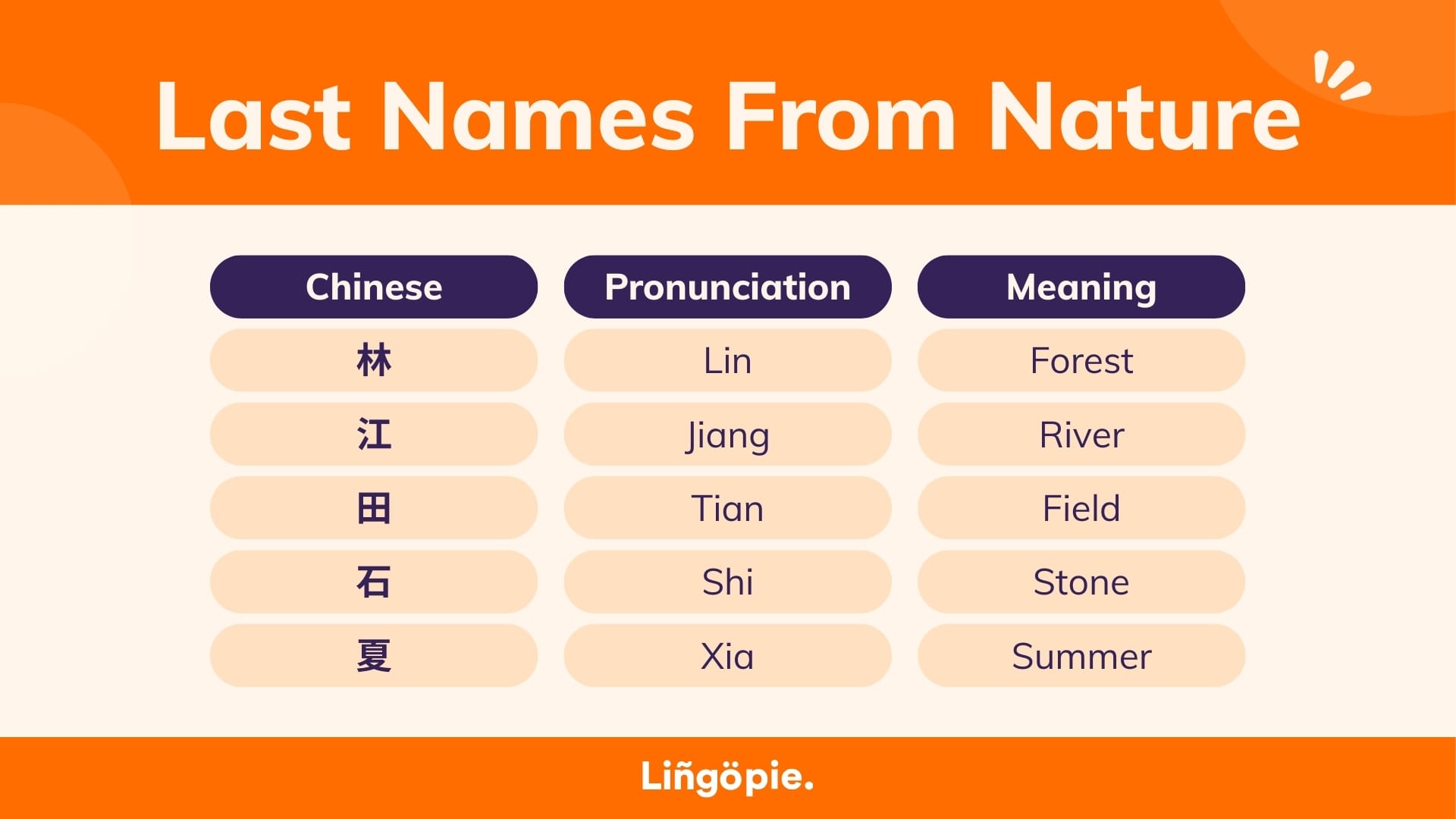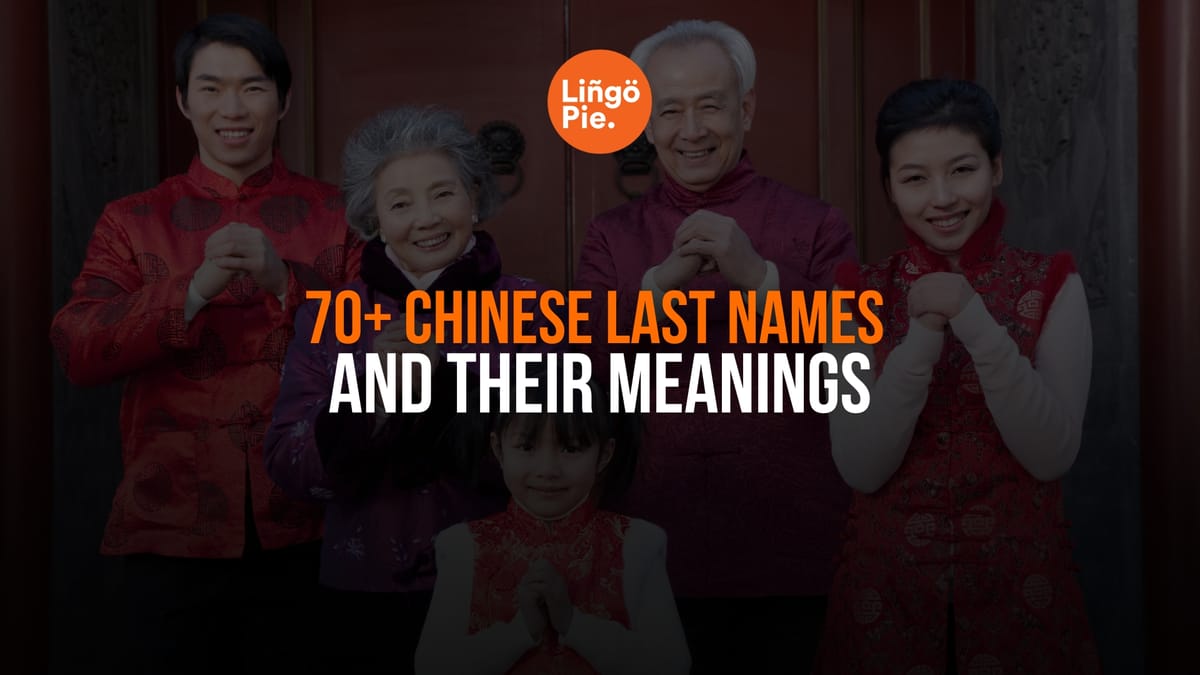Ever noticed how almost every romantic Chinese drama has a character with the last name Wang, Liu, or Zhang? Well, these Chinese surnames are incredibly common, each shared by tens of millions of people. In fact, just the top five Chinese last names alone account for over 30% of China’s entire population.
This isn’t unique to China either — if you’ve watched anime or japanese romance dramas, you’ve probably noticed the same trend with common Japanese last names, where a small group of surnames shows up again and again.
In this post, I’ll share 100 of the most common Chinese last names and what they reveal about Chinese culture. By the end of this post, I guarantee that you’ll better understand why certain characters in Chinese TV shows and movies bear their last names.

Top 10 Most Common Chinese Surnames
Wang (王) - "King"
With over 100 million bearers, Wang takes the crown as China's most common surname and literally means "King" or "Monarch." The character itself (王) consists of three horizontal lines representing heaven, earth, and humanity, connected by a vertical line symbolizing the king’s rule over all three realms.
Li (李) - "Plum"
The second most common surname in China, Li is shared by approximately 100 million people. It means "plum" and was the royal surname during the Tang dynasty. This surname has spread far beyond China's borders and is common in Korea (as "Lee") and Vietnam as well.
Zhang (张/張) - "Archer"
With around 95 million bearers, Zhang ranks third among Chinese surnames. The name comes from the invention of the bow and arrow by the grandson of the Yellow Emperor, making it a name with truly ancient origins. The character means "to stretch" (as in drawing a bow).

Liu (刘/劉) - "Kill"
This powerful surname was the royal name during the Han Dynasty. The character means "to kill or destroy," perhaps explaining why Liu villains in Cdramas often have such intimidating presences! Today, about 70 million people bear this name.
Chen (陈/陳) - "Exhibit"
While Chen ranks fifth in mainland China, it's actually the most common surname in Taiwan and Singapore. The name means "to exhibit" or "display." It originated from the ancient Chen Kingdom that existed during the Spring and Autumn Period (770-476 BCE).
Yang (杨/楊) - "Willow"
Yang refers to a type of tree and was the royal surname during the Zhou Dynasty. Today, it's shared by approximately 40 million people. The character can also mean "poplar" or "aspen" and symbolizes resilience and growth.
Huang/Wong (黄/黃) - "Yellow"
Huang simply means "yellow" and is the most popular surname in Guangdong, southern China. In Cantonese regions, it's usually romanized as "Wong" (think Fei Wong in many Hong Kong films). The color yellow has traditional associations with the emperor and nobility.
Zhao (赵/趙) - "Exceeding"
Approximately 25 million people share this surname, which was granted by emperors in the Song dynasty to those with outstanding service. The character suggests surpassing others or moving quickly forward.
Wu (吴/吳) - "Military"
From Chinese 吴 (wú), referring to the ancient state of Wu, which was located in present-day Jiangsu province. The name is associated with martial strength and discipline, reflecting a long history of military tradition.
Zhou (周) - "Circumference"
Zhou means "surrounding" or "whole" in Chinese and is shared by about 20 million people. The surname comes from the Zhou Dynasty, one of China's most influential early dynasties that ruled from 1046 to 256 BCE.

Surnames From Ancient States And Kingdoms
Many Chinese surnames come from ancient states, kingdoms, or fiefdoms that existed thousands of years ago:
Xu (徐) - "Gentle, Slow"
The surname originated from the ancient kingdom Xu located in the present Anhui Province. The original meaning of the character is "slowly" or "calmly."
Guo (郭) - "Outer City Wall"
A surname which means "wall surrounding the city." The name has a toponymic origin from a kingdom that existed during the ancient Xia dynasty.
Zheng (郑/鄭) - "Journey"
From Chinese 郑 (zhèng), which refers to the ancient state of Zheng that existed during the Zhou Dynasty.
Song (宋) - "Pine"
Named after the Song state and later the Song Dynasty. It was one of the most culturally rich periods in Chinese history.
Wei (魏) - "Height"
From Chinese 魏 (wèi) referring to the ancient state of Wei, which existed from the 5th to 3rd centuries BC.
Han (韩/韓) - "Han State"
The surname Han refers to an ancient state of Han, presently situated in the Henan and Shanxi provinces of China.
Qin (秦) - "Qin State"
The surname has its origin from "Qin," the first imperial dynasty in Chinese history.

Surnames From Nature And Geography
These surnames draw inspiration from natural elements, landscapes, and geographical features:
Lin (林) - "Forest"
Lin originated from the late Shang dynasty and means "tall trees or a forest."
Jiang (江) - "River"
From Chinese 江 (jiāng) meaning "river" or "Yangtze."
Tian (田) - "Field"
This surname means "field." Tian is derived from "Tan," an ancient city in the Shandong province.
Shi (石) - "Stone"
Shi means stone or rock and reflects durability and strength.
Xia (夏) - "Summer"
The surname Xia means "summer" and could be derived from the name of the Xia dynasty.
Ye (叶/葉) - "Leaf"
From Chinese 叶 (yè) meaning "leaf," symbolizing renewal and nature.
Fang (方) - "Square"
Fang means border, place, method, or square direction.
Bai (白) - "White"
A surname of Mongol origin, Bai means "white" and represents purity.
Pan (潘) - "Water Basin"
The surname Pan derives its name from a river that flows into the Han River.
Surnames Based On Occupations and Social Roles
These surnames reflect ancient professions, official positions, or social roles:
Sun (孙/孫) - "Grandson"
Sun means "grandchild" or "descendant" and was the imperial family name of the Wu Kingdom during the Three Kingdoms Period.
Ma (马/馬) - "Horse"
Though Ma means "horse" in Chinese, the surname itself has different origins, often adopted by Muslim Chinese communities because it sounds similar to "Muhammad."
Luo (罗/羅) - "Net"
Originally referring to a type of net or sieve used for catching fish or filtering.
Cao (曹) - "Manage"
A surname associated with literary talent and administrative ability.
Qian (钱/錢) - "Money"
Originally meaning "copper coins," this surname has been associated with wealth and prosperity.
Fu (傅) - "Tutor"
"Teacher" or "guide" with imperial origins believed to have been passed from the Yellow Emperor to one of his sons.
Surnames Based On Personal Characteristics
These surnames describe physical traits or personal qualities:
Zhu (朱) - "Red"
The surname Zhu refers to "crimson" or "red," a color associated with good fortune.
Hu (胡) - "Beard"
From Chinese 胡 (hú) meaning "beard, whiskers, recklessly, wildly."
Gao (高) - "Tall"
From Chinese 高 (gāo) meaning "tall" or "high," suggesting both physical height and moral elevation.
Xie (谢/謝) - "Thanks"
From Chinese 谢 (xiè) referring to gratitude or the minor state of Xie.
Xiao (萧/蕭) - "Mournful"
From Chinese 蕭 (xiāo) referring to a territory from the Zhou dynasty.
Yan (颜/顏) - "Handsome"
A surname meaning "beautiful" or "dignified appearance."
Bi (毕/畢) - "Complete"
A surname suggesting thoroughness and completion.
Yue (乐/樂) - "Music"
The character can also mean "happy" or "joyful," making it a name with positive connotations.
More Common Chinese Surnames
Du (杜) - "Birchleaf Pear Tree"
From Chinese 杜 (dù) meaning "stop, prevent" or "birchleaf pear tree."
Jin (金) - "Gold"
From Chinese 金 (jīn) meaning "gold," symbolizing wealth and prosperity.
Kong (孔) - "Opening"
The surname Kong originates from the family name of Confucius, China's most influential philosopher.
Zeng (曾) - "Ancestor"
Zeng originated from Zeng, a state in China, and refers to ancestral connections.
Gong (龚/龔) - "Respectful"
The meaning of Gong is "to give" and reflects deference to others.
Xiong (熊) - "Bear"
Xiong means "bear" and suggests strength and power.
Mao (毛) - "Hair"
Mao refers to "fur" or "feathers" and originated from an ancient area during the Zhou dynasty.
Lei (雷) - "Thunder"
A powerful surname suggesting natural force and impact.
Ai (艾) - "Wormwood Plant"
Named after a medicinal herb used in traditional Chinese medicine.
Long (龙/龍) - "Dragon"
A powerful surname associated with the mythical creature central to Chinese culture.
Hong (洪) - "Flood"
The surname Hong refers to "rainbow" or something expansive and grand.
Cai (蔡) - "Firewood"
From Chinese 蔡 (cài) referring to the ancient state of Cai that existed during the Zhou dynasty.
Zhong (钟/鐘) - "Bell"
A surname which means "bell" and originated from "Zhongli," an ancient Chinese state.
Hao (郝) - "Brightness"
Hao refers to the name of an ancient place or state.
Guan (关/關) - "Mountain Pass"
Guan means "mountain pass or guarded path" and derived from a state that existed during Zhou dynasty.
Lu (陆/陸) - "Land"
Lu means high and flat land or ordinary road.
Qiu (邱) - "Hill"
Qiu means hillock, mound, or grave country.
He (何) - "Grain"
A common Chinese surname with origins from the "Ji clan of the Zhou Dynasty" and the "Jiang clan of Yandi."
Liang (梁) - "Bridge"
Liang means "bridge or pillar" and originated from a toponymic origin.
Tang (唐) - "Hall"
Tang means "soup" or "boiling water" and is associated with the Tang Dynasty.
Feng (冯/馮) - "Gallop"
From Chinese 冯 (féng), which referred to an ancient city in Henan province.
Peng (彭) - "Sound of Drums"
Peng refers to individuals descended from Peng Zu, a legendary figure from the Shang dynasty.
Zou (邹/鄒) - "District"
Zou refers to an ancient place or state.
Lü/Lu (吕/呂) - "Spine"
Originally a place name that became common during the Zhou Dynasty.
Cui (崔) - "Mountain High"
Cui means tall, grand, or fast and suggests imposing stature.
Nie (聂/聶) - "Whisper"
A name suggesting quiet conversation or secrets.
Mo (莫) - "None"
A surname suggesting mystery or absence.
Chang (常) - "Constant"
A surname suggesting reliability and persistence.
Dai (戴) - "Wear"
Originally referring to someone who made or wore headgear.
Ding (丁) - "Man"
From Chinese 丁 (dīng) meaning "man" or "person."
- 7 Romantic Chinese Shows You Need To Watch With Your Partner
- 6 Chinese Short Films Everyone Learning Chinese Should Watch
- 20+ Chinese Words And Phrases From Scissor Seven
Bring Chinese Surnames To Life With Lingopie

Now that you understand the rich history behind these common Chinese surnames, why not see them in action? Lingopie offers an immersive way to experience these names in context through authentic Chinese dramas, movies, and shows.
With Lingopie, you can:
- Watch hundreds of Chinese dramas where these surnames come to life through compelling characters
- Learn the pronunciation of these names from native speakers
- See the Chinese characters alongside the action, reinforcing your recognition of these names
- Understand cultural contexts that reveal why certain characters have specific surnames
Ready to see these surnames in context? Start learning Chinese with Lingopie today!





![What’s The Best Way To Learn Spanish? [5 Best Tips]](/blog/content/images/size/w1200/2025/04/Best-way-to-learn-Spanish.jpg)



